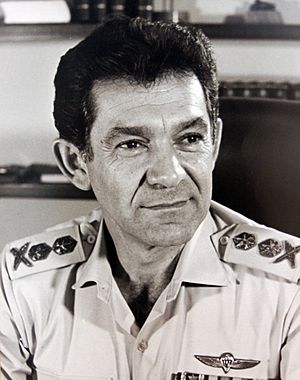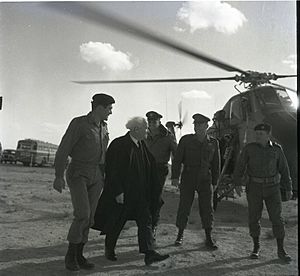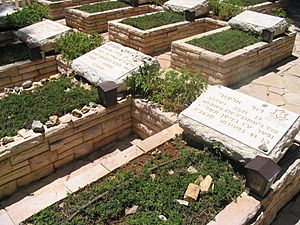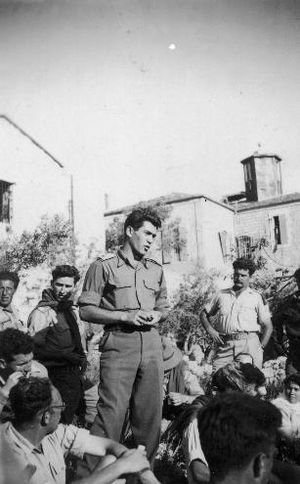David Elazar facts for kids
Quick facts for kids
David Elazar
|
|
|---|---|

David Elazar (Dado)
|
|
| Nickname(s) | Dado, Big D |
| Born | 27 August 1925 Sarajevo, Yugoslavia |
| Died | 15 April 1976 (aged 50) Jerusalem, Israel |
| Allegiance | |
| Service/ |
Palmach |
| Years of service | 1942–1973 |
| Rank | |
| Commands held | Director of Operations Chief of Staff |
| Battles/wars | 1948 Arab-Israeli War Suez Crisis Six-Day War Yom Kippur War |
David "Dado" Elazar (Hebrew: דוד אלעזר; 27 August 1925 – 15 April 1976) was a very important Israeli military leader. He served as the ninth Chief of Staff (the highest-ranking officer) of the Israel Defense Forces (IDF) from 1972 to 1974. He had to step down after the Yom Kippur War.
Contents
Who Was David Elazar?
David Elazar, known as "Dado," was born in Sarajevo, Yugoslavia, in 1925. His family had a Sephardic Jewish background. In 1940, when he was 15, he moved to Palestine (which later became Israel) through a program called Youth Aliyah. He settled on a kibbutz, which is a type of community farm, called Ein Shemer.
Soon after arriving, he joined the Palmach, a special fighting force. He fought in many important battles during the 1948 Arab-Israeli War, including the Battle of San Simon Monastery in Jerusalem. He was a brave soldier and quickly moved up in the ranks. He eventually became the commander of the famous HaPortzim Battalion, part of the Harel Brigade.

After the war, Elazar stayed in the army. He joined the armored corps, which uses tanks, after the 1956 Sinai campaign. He became the deputy commander and then the commander of the armored corps in 1961. He held this role until 1964.
From 1964 to 1969, he was the Chief of the Northern Command. During the Six-Day War in 1967, he strongly believed that Israel should take control of the strategic Golan Heights, which was then part of Syria. He led the forces that captured this area in just two days.
After the Six-Day War, Elazar became the chief operations officer for the general staff. On January 1, 1972, he was appointed the Chief of Staff of the IDF.
Leading the Army: Chief of General Staff
When David Elazar became Chief of Staff, his first few months were spent dealing with serious attacks. On May 30, 1972, a group called the Japanese Red Army attacked Lod Airport, killing 25 people. Later that year, on September 5, another group attacked Israeli athletes at the 1972 Summer Olympics in Munich. This event became known as the Munich Massacre.
In response, Elazar ordered a large military action against bases in Syria and Lebanon. Three Syrian jets were shot down, and many fighters were killed. In Operation Spring of Youth, which happened on April 9–10, 1973, several important Palestinian leaders were killed in Beirut by the IDF.
One difficult decision Elazar made was to order the shooting down of a Libyan passenger plane. The plane had flown into Israeli airspace and did not respond to warnings. It was thought to be on a dangerous mission. Sadly, it was later discovered that it was a civilian aircraft that had made a navigation mistake, and over 100 people died.
In May 1973, the IDF declared a state of emergency because Egyptian troops were moving. However, it turned out to be just a training exercise, and the emergency was called off. This made the Israeli military believe that Egypt was not preparing for war. But later, it became clear that Egypt's frequent exercises were a trick to make Israel feel safe before a real attack.
On September 13, Israel shot down thirteen Syrian fighter jets that had tried to attack Israeli planes.
The Yom Kippur War
What Happened Before the War?
In 1957, Israel had to leave the Sinai Peninsula, which it had taken from Egypt. In 1967, Egypt's President Gamal Abdel Nasser closed the Tiran Strait to Israeli ships. This was a major reason for the 1967 war, during which Israel took control of the Sinai again.
On October 1, 1973, the armies of Egypt and Syria were put on high alert. However, Israeli intelligence made a mistake and thought war was "unlikely." So, Israel only called up a few reserve units. In the early hours of October 6, which was Yom Kippur (the holiest day in the Jewish holidays), Elazar finally became sure that war would start that day. But the Chief of Military Intelligence, Major General Eli Zeira, and the Minister of Defense, Moshe Dayan, still thought it was very unlikely.
Dayan's belief had two big effects:
- Dayan did not approve Elazar's request to call up all reserve soldiers. (Elazar still decided to call up some reserves on his own on October 5).
- Dayan did not approve Elazar's plan for a surprise air attack, which was ready for 11:00 a.m. on Yom Kippur. The planes were ready, but they never took off.
The War Itself
At 2:00 p.m. on Yom Kippur, the armies of Egypt and Syria launched a surprise attack on Israel.
After many fierce battles, a failed counter-attack in the Sinai, and heavy losses for Israel's air force and ground troops, the invasion was finally stopped. On October 11, fighting in the north pushed the Syrian army back. On October 16, Israeli troops crossed the Suez Canal under the command of General Ariel Sharon.
In the early days of the war, Elazar was one of the few Israeli commanders who stayed calm and even hopeful. This was very different from the political leaders, especially Moshe Dayan, who worried about Israel's future. The war also showed big disagreements among the top military leaders, especially on the Southern Front. Elazar even had to replace the Chief of the Southern Command, Major General Shmuel Gonen, with former Chief of General Staff Haim Bar-Lev. He also asked generals Rehavam Zeevi and Aharon Yariv, who had recently retired, to be his special advisors.
By the end of the war, the IDF had moved deep into Syrian territory. Mount Hermon, which Israel had lost at the start of the war, was taken back. On the Southern Front, the Egyptian Third Army was surrounded in the Sinai, and Israeli troops had taken control of the west bank of the Suez Canal. They used new tactics led by General Ariel Sharon.
Even with these military successes, Israel suffered many casualties. The Egyptians still held some land east of the canal, and no major cities were captured. Although Suez city was surrounded, the Battle of Suez was not a success for Israel, costing 80 IDF soldiers killed and 120 wounded.
What Happened After the War?
The high number of casualties and the fact that Israel was caught unprepared led to many public protests.
On November 21, right after the war ended, the Agranat Commission was formed. Its job was to find out why the IDF was so unprepared for the war. The commission met for several months, holding 140 sessions and listening to many witnesses. On April 1, 1974, it released its first report, recommending that Elazar be removed as Chief of Staff. The report said that "Elazar bears personal responsibility for the assessment of the situation and the preparedness of the IDF." It suggested that he and military intelligence chief Eli Zeira should leave their jobs.
Elazar immediately resigned. He felt he had been treated unfairly, especially since the report did not suggest any actions against the country's political leaders. He also felt his actions during the war were not considered. In his resignation letter, Elazar wrote that it was not the Chief of Staff's job to handle all small details. He also questioned why the commission thought he should have known to call up reserves on October 5, but the Defense Minister, who had the same information, did not.

On April 15, 1976, David Elazar passed away from a heart attack while swimming. He is buried on Mount Herzl in Jerusalem.
David Elazar's Legacy
David Elazar, or "Dado," is still a talked-about figure in Israel today. The Agranat Commission's conclusion that he was personally responsible for the lack of preparation for the war was not fully accepted by the public. Many people now believe that Elazar was a very skilled war leader. They think he stayed calm during a crisis and made the right big decisions.
Israeli General Aviezer Ya'ari, who led the IDF's research department, says two decisions Elazar made early in the war were key to Israel's eventual victory, even with the tough start. One was Elazar's choice to move reserve forces from the Jordanian border to the Golan Heights. These forces helped stop the Syrians' quick advance and turn the battle around. The second was his decision to wait for the Egyptians to attack first in the Sinai before launching more counter-attacks. This led to the Battle of the Sinai, which Israel won decisively. This weakened Egyptian resistance and helped the IDF cross the Suez Canal and surround most of the Egyptian Third Army by the end of the war.
See also
 In Spanish: David Elazar para niños
In Spanish: David Elazar para niños
- Agranat Commission
- List of Israel's Chiefs of the General Staff
 | Frances Mary Albrier |
 | Whitney Young |
 | Muhammad Ali |


